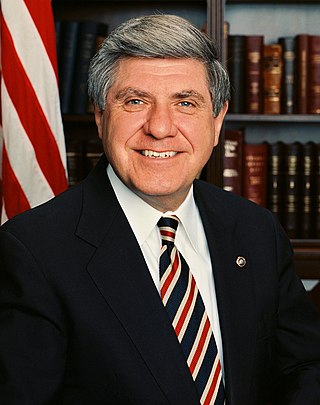
Earl Benjamin Nelson is an American attorney, businessman, and politician who served as the 37th governor of Nebraska from 1991 to 1999 and as a United States Senator from Nebraska from 2001 to 2013. He is a member of the Democratic Party, and as of 2024, the last Democrat to hold any statewide elected office in Nebraska.

Michael Keith Simpson is an American politician and former dentist serving as the U.S. representative for Idaho's 2nd congressional district since 1999. The district covers most of the eastern portion of the state, including Idaho Falls, Pocatello, Sun Valley, Twin Falls and the northern two-thirds of Boise. A member of the Republican Party, Simpson was first elected to public office in 1984, and was elected to the House in the 1998 elections, succeeding Mike Crapo. He served as Speaker of the Idaho House of Representatives from 1992 to 1998.
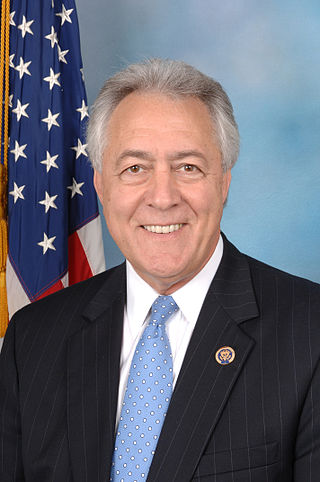
Rodney McKinnie Alexander is an American politician and member of the Republican Party who served as the Secretary of the Louisiana Department of Veterans Affairs from September 30, 2013, until June 3, 2014. Previously he was the U.S. representative for Louisiana's 5th congressional district from 2003 to 2013. First elected as a Democrat, he changed parties in 2004 to run as a Republican and was re-elected five times.
The doctrine of nondelegation is the theory that one branch of government must not authorize another entity to exercise the power or function which it is constitutionally authorized to exercise itself. It is explicit or implicit in all written constitutions that impose a strict structural separation of powers. It is usually applied in questions of constitutionally improper delegations of powers of any of the three branches of government to either of the other, to the administrative state, or to private entities. Although it is usually constitutional for executive officials to delegate executive powers to executive branch subordinates, there can also be improper delegations of powers within an executive branch.
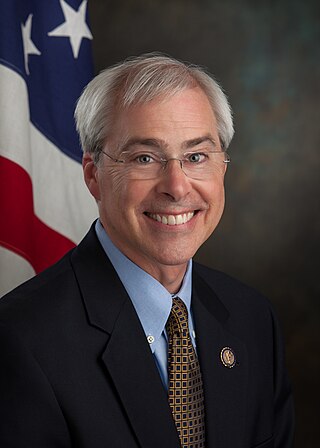
John Jenkins Barrow is an American politician who was the U.S. representative for Georgia's 12th congressional district from 2005 to 2015. The district includes much of the Georgia side of the Central Savannah River Area and includes counties as far south as Coffee County and as far west as Laurens County. He is a member of the Democratic Party.

The Roberts Court is the time since 2005 during which the Supreme Court of the United States has been led by John Roberts as Chief Justice. Roberts succeeded William Rehnquist as Chief Justice after Rehnquist's death.
The National Retail Federation (NRF) is the world's largest retail trade association. Its members include department stores, catalog, Internet, and independent retailers, restaurants, grocery stores, multi-level marketing companies and vendors.
The Origination Clause, sometimes called the Revenue Clause, is Article I, Section 7, Clause 1 of the U.S. Constitution. The clause says that all bills for raising revenue must start in the U.S. House of Representatives, but the U.S. Senate may propose or concur with amendments, as in the case of other bills.
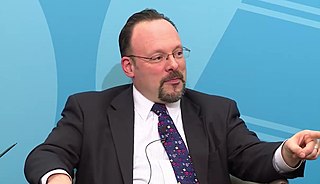
Jonathan H. Adler is an American legal commentator and law professor at the Case Western Reserve University School of Law. He has been recognized as one of the most cited professors in the field of environmental law. His research is also credited with inspiring litigation that challenged the Obama Administration's implementation of the Affordable Care Act, resulting in the Supreme Court's decision in King v. Burwell.

Glenn William "GT" Thompson Jr. is an American politician serving as the U.S. representative for Pennsylvania's 15th congressional district since 2019. A member of the Republican Party, he was first elected to Congress in 2008 for the state's 5th congressional district; Thompson was redistricted to the 15th congressional district in the 2018 election by an order of the Supreme Court of Pennsylvania. Since 2023, he has chaired the House Agriculture Committee.

The Affordable Care Act (ACA), formally known as the Patient Protection and Affordable Care Act (PPACA) and colloquially known as Obamacare, is a landmark U.S. federal statute enacted by the 111th United States Congress and signed into law by President Barack Obama on March 23, 2010. Together with the Health Care and Education Reconciliation Act of 2010 amendment, it represents the U.S. healthcare system's most significant regulatory overhaul and expansion of coverage since the enactment of Medicare and Medicaid in 1965.
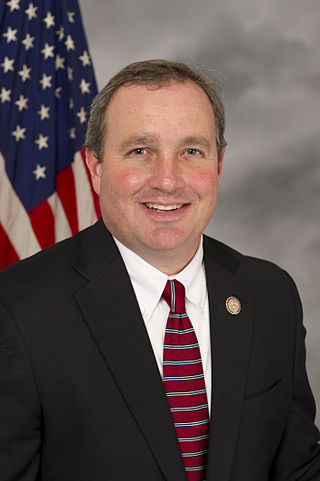
Jeffrey Darren Duncan is a United States representative for South Carolina's 3rd congressional district since 2011. His district comprises nine counties, two of these counties being manufacturing centers for the state. On January 17, 2024, Duncan announced that he would not run for re-election. Duncan previously served in the South Carolina House of Representatives from 2002 to 2010 when he retired to run for the US House of Representatives.
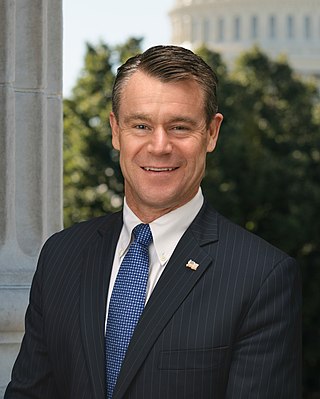
Todd Christopher Young is an American attorney and politician serving as the senior United States senator from Indiana, a seat he has held since 2017. A member of the Republican Party, Young previously served as the U.S. representative for Indiana's 9th congressional district. He was elected to the United States Senate in the November 8, 2016, general election, succeeding retiring Republican Dan Coats. From 2019 to 2021, he served as the chair of the National Republican Senatorial Committee. Young was reelected in 2022.
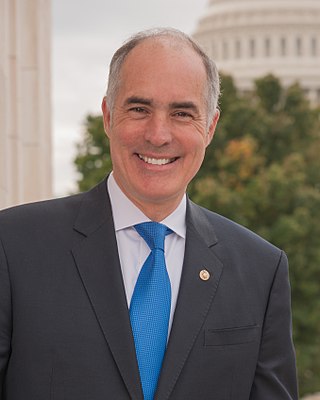
Robert Patrick Casey Jr. is an American lawyer and politician who is the senior United States senator from Pennsylvania, a seat he has held since 2007. He is a member of the Democratic Party.
National Federation of Independent Business v. Sebelius, 567 U.S. 519 (2012), is a landmark United States Supreme Court decision in which the Court upheld Congress's power to enact most provisions of the Patient Protection and Affordable Care Act (ACA), commonly called Obamacare, and the Health Care and Education Reconciliation Act (HCERA), including a requirement for most Americans to pay a penalty for forgoing health insurance by 2014. The Acts represented a major set of changes to the American health care system that had been the subject of highly contentious debate, largely divided on political party lines.
Since the passage of the Affordable Care Act (ACA), there have been numerous actions in federal courts to challenge the constitutionality of the legislation. They include challenges by states against the ACA, reactions from legal experts with respect to its constitutionality, several federal court rulings on the ACA's constitutionality, the final ruling on the constitutionality of the legislation by the U.S. Supreme Court in National Federation of Independent Business v. Sebelius, and notable subsequent lawsuits challenging the ACA. The Supreme Court upheld ACA for a third time in a June 2021 decision.

The America's Small Business Tax Relief Act of 2014 was a bill that would amend section 179 of the Internal Revenue Code, which mostly affects small- to medium-sized businesses, to retroactively and permanently extend from January 1, 2014, increased the cap on the amount of investment that can be immediately deducted from taxable income. The bill would return the tax code to its 2013 status and make the change permanent.

Sissel v. United States Department of Health & Human Services was a lawsuit filed by the Pacific Legal Foundation as a constitutional challenge to the Patient Protection and Affordable Care Act (ACA). The plaintiffs claimed that the ACA's enactment violated the Origination Clause of the Constitution. The suit was dismissed by the U.S. District Court for the District of Columbia, and the dismissal was affirmed by the U.S. Court of Appeals for the District of Columbia Circuit. The plaintiffs sought review by the U.S. Supreme Court, which declined to hear an appeal.
The Health Equity and Access Reform Today Act of 1993 was a health care reform bill introduced into the United States Senate on November 22, 1993, by John Chafee, a Republican senator from Rhode Island, and Chair of the Republican Health Task Force. It was co-sponsored by eighteen other Republican senators, including then-Senate Minority Leader Bob Dole, and two Democratic Senators, Bob Kerrey of Nebraska and David Boren of Oklahoma. It was read twice in the Senate, but was neither debated nor voted upon.
National Federation of Independent Business v. Department of Labor, Occupational Safety and Health Administration, 595 U.S. ___ (2022), is a Supreme Court of the United States case before the Court on an application for a stay of the Occupational Safety and Health Administration's COVID-19 vaccination or test mandate. On January 13, 2022, the Supreme Court ordered a stay of the mandate.











